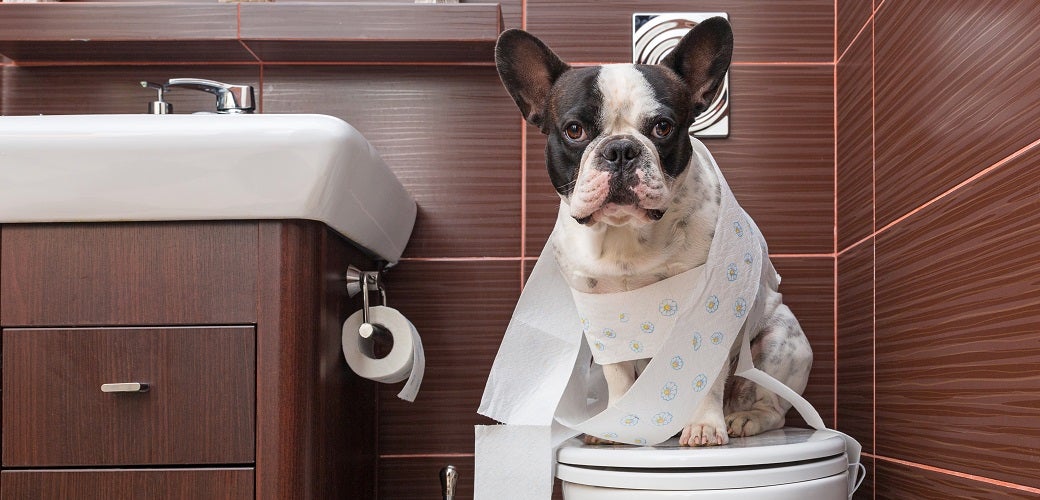Many dogs drink from the toilet even when discouraged by their owners. But what happens if they drink it when it has toilet bowl cleaner in it?
Most dogs are going to be perfectly fine after drinking toilet water, but there are some exceptions. If you want to know whether your dog needs to see a vet, you need to know what you’ve been using to clean your toilet. If your pet shows any signs of distress, call the vet immediately.
Some things that are safe for humans are toxic to pets, and they aren’t always easy to spot. Something as simple as a grape can be fatal to a dog. Because of this, it’s better to be safe rather than sorry when they eat or drink anything unusual.
Toilet Bowl Water and Your Pets: The Dangers Aren’t Always Crystal Clear

It’s not uncommon to see a dog (or a very adventurous cat) with their head in a toilet, lapping up some unattended toilet bowl water. While this may seem like a safe practice as long as the bowl is clean, many of us use different products to keep our toilets sparkling. Have you ever wondered would happen if your pet took a lick of the blue water in the toilet? When it comes to toilet bowl water and our four-legged friends, there are a few things that the Animal Poison Control Center (APCC) wants you to keep in mind.
Colorful Cleaning Agents
Easy-to-use discs or tablets that go into the toilet bowl or clip on the side of the toilet are usually the most commonly found cleaners in the bathroom. These cleaners often turn the water blue and may seem unsafe for pets, but rest easy, that blue water is unlikely to harm your pet—although we don’t recommend letting them regularly drink the treated water. Like most things that can be toxic, the amount that your pet consumes is important. In this case, the chemicals from the toilet bowl cleaner found in the tablets or discs are diluted in water, and although they can cause some mild stomach upset, more severe signs aren’t expected.
If your pet drinks some of that blue toilet water, you can give them a small amount of milk or fresh water to help dilute the mixture even further. Be sure to contact your veterinarian or the ASPCA Animal Poison Control Center if more than mild stomach upset develops.
If your pet manages to ingest the disc or tablet that goes into the toilet directly, the results can be much more serious. Many of these products can cause burns in the mouth and the throat. If you see your pet chewing on one of these tablets, you should contact your veterinarian or the ASPCA Animal Poison Control Center immediately.
Also, don’t forget to check out the full list of potentially harmful household products.
Pesky Chemicals
During the winter, many people use antifreeze in their toilets to prevent the water from freezing. Antifreeze is a lethal poison for dogs and cats. If you use this chemical during the winter months, be sure to keep your toilet lids down and your chemicals out of paws’ reach. Also, be sure to exercise caution if you are taking your pet to visit a friend or family member, you never know what chemicals others may use.
How’s the Water Quality?
While the water quality in the toilet may seem like it is the same from the tap, this may not always be the case. Even in the cleanest of households, the toilet is still a breeding ground for bacteria and germs that could potentially make your pet sick. Gastrointestinal upset could result from stagnant, bacteria-filled toilet water.
A Slip of the Tongue—Or Paw!
Women and children aren’t the only ones at risk of falling in when a toilet seat is left up. Smaller pets that may be inclined to climb up and investigate the water in the toilet bowl could easily fall in, putting them at risk of becoming trapped, injured or even drowning depending on their size and the level of water in the bowl.
Although most of these risks seem relatively low-grade, it never hurts to keep a watchful eye on your pets. Try keeping the seat down at all times to discourage them from rehydrating themselves with toilet bowl water. Also, consider replacing their standard drinking bowls with a pet water fountain to keep your pet pleased with fresh running water.
If you believe that your pet has ingested a potentially poisonous item, contact your veterinarian or the ASPCA Animal Poison Control Center at (888) 426-4435 immediately.
Other Ways to Help:

How Do Pets Get Into Bleach?
For the most part, its exactly as youd expect, says Tina Wismer, DVM, DABVT, DABT and medical director of the ASPCA Animal Poison Control Center. “People are cleaning their floor and pour some bleach into a bucket,” she says. “Maybe they step away for a minute and forget to block it off from their pets or they spill some and arent able to clean it up in time.”
If you dilute the bleach with water before using it to clean, you may prevent the worst possible poisoning. “The more diluted it is, the less toxic it is,” Wismer says.
Severity of the poisoning also depends on how much the animal is exposed to, and dogs and cats (as well as some breeds of each) will react differently to consuming the chemical.
“Some dog breeds like Pomeranians will turn their nose up at bleach after tasting it,” Hovda says. “Labradors, however, might down the entire bucket.” She adds that cats are more like Pomeranians but they could experience bleach poisoning if they walk on a bleach spill and lick their paws afterward.
FAQ
What happens if a dog drinks toilet water with bleach?
How long does it take for a dog to get sick from bleach?
Can diluted bleach water hurt dogs?